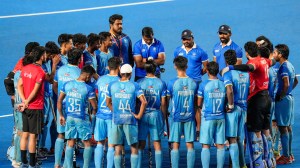Musical on Ambedkar opens in city, talks of the right to question, equality
In one of the scenes in director Mahua Chauhan’s 120-minute musical, Babasaheb: The Grand Musical, the stage of Jawaharlal Nehru Stadium’s weightlifting auditorium is turned into Pune’s Yerwada Jail to showcase the enactment of a conversation between Mahatma Gandhi and Dr BR Ambedkar.
 During the musical event on the life of B R Ambedkar at the JLN Stadium, Friday. (Delhi govt)
During the musical event on the life of B R Ambedkar at the JLN Stadium, Friday. (Delhi govt)In one of the scenes in director Mahua Chauhan’s 120-minute musical, Babasaheb: The Grand Musical, the stage of Jawaharlal Nehru Stadium’s weightlifting auditorium is turned into Pune’s Yerwada Jail to showcase the enactment of a conversation between Mahatma Gandhi and Dr BR Ambedkar.
In a clash of ideologies, both are seen to reinforce their own interpretation of the concept of the complicated Indian caste system. While Ambedkar sees caste as a political inquest and wanted separate, individual electorates for India’s depressed classes, Gandhi looks at caste as a social issue and is not in favour of segregation. Soon after the British government announced separate electorates on August 15, 1932, Gandhi commenced his fast unto death in the Pune jail where he was being held under sedition charges.
“Aap logon ko daya sikhaana chahte hain. Main unhe sashakt banaana chahta hoon (You want to teach compassion to people, I want to empower them),” says Ambedkar to Gandhi and signs the Poona Pact, which ends Gandhi’s fast. A huge round of applause followed as actor Rohit Roy attempted to bring Ambedkar to life. Planned by the Delhi government to be presented last year, the production that took six months to create was postponed due to the pandemic.
As a 40-feet revolving platform created by set designer Omung Kumar played the backdrop for the musical, the grand theatrical production with over 10 songs (created by Delhi-based folk-rock band Indian Ocean) and 160 dancers and supporting actors attempted to revive the portrait of a man whose criticism for the chasm separating the social classes led him to fight for a number of causes, including water satyagraha and women empowerment.
From a young child growing up in Madhya Pradesh’s Mhow (now Ambedkar Nagar) who learned his lessons sitting outside class and drank water that the school peon poured for him to finding himself through education, first in Mumbai and then at Columbia University, and eventually becoming the father of the Indian Constitution, the play takes one through different stages of Ambedkar’s life while trying to combine realism with theatricality.
“Satta ko sawal sunne ki aadat nahi hoti, wo toh apne hi mann ki baat karti hai (authority is not used to listening to questions, she talks of her own contemplations),” said the narrator of the play Teekam Joshi to thunderous applause.
The play, helmed by Roshan Abbas as its creative director, concluded with Ambedkar reciting the preamble to the Constitution. And through it all, Indian Ocean’s music merged with Vineet Panchhi and Kausar Munir’s lyrics kept the people hooked.
Delhi Chief Minister Arvind Kejriwal, who was present at the event with several AAP leaders, said, “Babasahab Ambedkar’s life is inspirational… We thought that theatre is the best way to make his story reach ordinary people. The more you study his life, the more one finds it hard to believe that a person like him was born. Einstein once said of Gandhi that ‘the future generations will refuse to believe that such a man walked on earth in flesh and blood’. I think his quote fits really well on Babasahab.”
With two shows each day, it will be staged till March 12.








